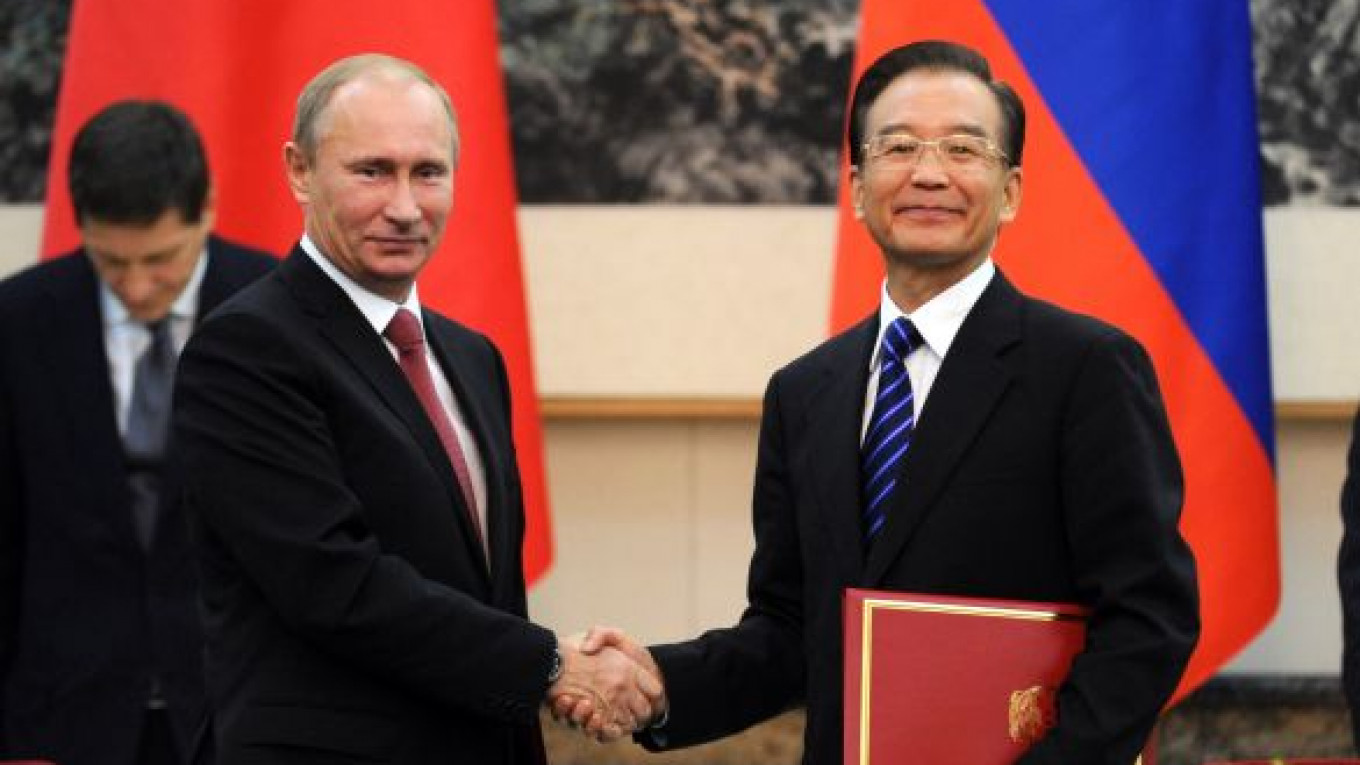BEIJING — Prime Minister Vladimir Putin and Chinese leaders opened two days of meetings Tuesday aimed at boosting relations amid strains over declining military sales and stalled talks over energy deals.
"Those who sell always want to sell at a higher price, while those who buy want to buy at a lower price. We need to reach a compromise that will satisfy both sides," Putin told reporters after meeting with Premier Wen Jiabao. He is to meet President Hu Jintao on Wednesday.
Besides a struggle to increase trade and agree on sales of Russian gas to fuel China's booming economy, Moscow is also unhappy with China's copying of Russian fighter jets and other military hardware and recently announced the arrest of a Chinese man accused of seeking to buy military secrets.
Putin's two-day visit follows his recent announcement that he plans to swap jobs next year with President Dmitry Medvedev, returning him to the top position he held for eight years. Many observers say that transition could see Russia turn eastward after years of warming ties with the West under Medvedev.
One area of cooperation in which China and Russia appear closer is international policy. Last week, both vetoed a UN Security Council resolution condemning Syria for its brutal crackdown on pro-reform protesters that has killed nearly 3,000 people since March.
The vetoes drew heavy criticism from U.S. Secretary of State Hillary Clinton.
Russia and China are also seen as key to how the Group of 20 responds to renewed fears that the global economy is headed toward a new recession.
Bilaterally, the two have worked to overcome mutual distrust from the Cold War and have increased two-way trade volume to $35.9 billion in the first half of the year, up 39.6 percent from the same period last year, according to official Chinese figures.
Wen told reporters that China wanted to push ahead a "comprehensive strategic partnership" with Russia that would safeguard world stability and development.
Russian and Chinese officials say deals worth $7 billion are to be signed during the visit in fields ranging from mining to biotechnology and space exploration.
The sides are looking for even more cross-border investment, and on the eve of Putin's visit, Chinese Vice Premier Wang Qishan called for more financial cooperation and accelerated construction of cross-border highways, railways, bridges, power grids, telecommunications links, and oil and gas pipelines.
But hanging over the visit is last week's announcement in Moscow that Russia's intelligence service had detained an alleged Chinese spy who tried to obtain designs of an advanced missile system as part of Beijing's efforts to update its weaponry.
The Chinese national, who worked as an interpreter for visiting Chinese officials, attempted to buy documentation for the S-300 long-range surface-to-air missile system, the Federal Security Service said. He faces up to 20 years in jail if convicted.
The truck-mounted S-300 is capable of shooting down aircraft, cruise missiles and ballistic missile warheads at ranges of more than 144 kilometers and at altitudes of about 27,400 meters.
In recent years, Russia banned the sale of the S-300 systems to Iran and Syria following international pressure. China has bought an export version of the system considered less capable than that used by Russia's armed forces.
Friction has also arisen from China's copying of Russian military hardware, especially the Su-27 jet fighter and its aircraft carrier variant, the Su-33.
Such copying has contributed to a virtual collapse in Chinese arms sales from Russia, further exacerbating the trade imbalance between the sides and fueling a growing competition for export markets among developing nations.
A Message from The Moscow Times:
Dear readers,
We are facing unprecedented challenges. Russia's Prosecutor General's Office has designated The Moscow Times as an "undesirable" organization, criminalizing our work and putting our staff at risk of prosecution. This follows our earlier unjust labeling as a "foreign agent."
These actions are direct attempts to silence independent journalism in Russia. The authorities claim our work "discredits the decisions of the Russian leadership." We see things differently: we strive to provide accurate, unbiased reporting on Russia.
We, the journalists of The Moscow Times, refuse to be silenced. But to continue our work, we need your help.
Your support, no matter how small, makes a world of difference. If you can, please support us monthly starting from just $2. It's quick to set up, and every contribution makes a significant impact.
By supporting The Moscow Times, you're defending open, independent journalism in the face of repression. Thank you for standing with us.
Remind me later.






